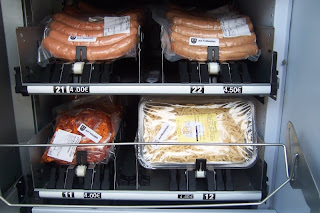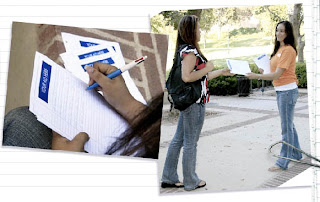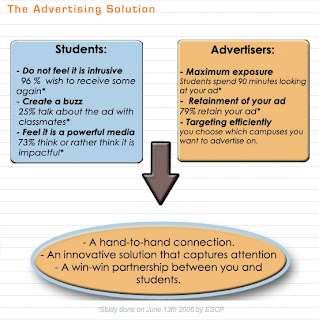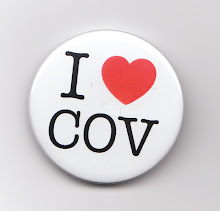1. Bikeworks Community Cycle Center
2. RecycleBank
3. Tadacopy: Free photocopy for students
4. Internet Voting in Estonia
5. Meet Up "Let's use the Internet to get people off the internet"
6. Bar None - Lexington
7. Kinded: Pass it on
8. LETS LINK UK
9. Bellenden Big Lunch
10. Spotify: Volume Sensitive advertising
This is my final list of ten innovations that i particularly liked and thought could be used on a more global scale. Special mention goes to the human Kit Kat vending machine which made me a laugh and is a fantastic idea as well as the graffiti classes which I think are very important for children in developing creative talent.
Thursday
The human vending machine

Having looked at innovations in vending machines in several posts here is another that really made me laugh. Kit Kat has launched its human vending machine which is exactly how it sounds. Instead of the Kit Kats being dispensed by the machine itself they are dispensed by a human inside the machine. The human dispenser's arms and face are on display so that customers can have a conversation with them, while dispensing the chocolate. This idea is something that is actually more common in Japan, where there are many more human vending machines.
A press release from Kit Kat on RealWire explains the idea, "Rather than being victim of your favoured chocolate bar getting stuck in the mechanisms of a traditional vending machine; the Kit Kat Human Vending Machine is operated by an actual human ‘vendor.’ The consumer will experience the speed and efficiency of a normal vending machine, with the added bonus of having a person to chat to and physically hand them their chocolate treat.
The innovative vending machine is part of the latest Kit Kat ‘Working Like a Machine’ campaign, which plays off the idea that people are overwhelmed with the monotony of everyday life and so need to take a break. Consumers better just hope the ‘vendor’ isn’t having his very own break should they need a chocolate break of their own."
While this is a fun innovation that works as part of an advertising campaign it actually asks some more important questions. For example is a human or a machine more efficient. While a machine allows no room for human error, if an item is stuck in the machine it cannot do anything about it, whereas a human can. There is the added incentive for the customer of being able to have a conversation with the human dispenser or asking questions about the product.
There would be no maintenance or repair costs to machines for its owners, however dispensers would need to be paid a wage. Despite this the added incentive of the human element may increase the likelihood of people buying from these machines and cover any human costs, while using humans would also create more employment opportunities.
This is still a very new concept to the UK, so it is hard to say whether it will be a success. If it was, there are so many positives that could be achieved using human vending machines that it could be exported to other countries. I feel it would most likely be successful in busy areas, such as high streets, city centers and train stations as demonstrated in the examples. This idea is another example of how technology can often make us less social and this is an innovation that ensures the same result but brings back the art of communication.
http://www.realwire.com/release_detail.asp?ReleaseID=11406
Uniqlo using a similar idea of the human vending machine in New York: http://gizmodo.com/5092433/uniqlo-human-vending-machine-previews-our-future-in-the-robot-apocalypse
Vending machines create 24 hour farmers market

The current financial climate has made it harder to support our local farmers and buy local produce. Farmers often have to sell to supermarkets who will pay them far less for their goods, however a German farm has now made it a little easier for us to buy local produce.
The farm, Peter-und-Paul-Hof have proposed vending machines as future of selling local produce more efficiently. The farm has collaborated with vending manufacturer Stuewer and are now able to sell fresh milk, eggs, butter, cheese, potatoes and sausage in thirteen German towns and communities through the use of these vending machines. Springwise reports, "It's not a solution that sprung up overnight. Initially, Peter-und-Paul-Hof were operating a service delivering milk to their customers. Finding this too time-consuming, they began encouraging customers to collect the milk from fridges on their farm, which proved successful and inspired them to use vending machines as a more versatile solution.
The Regiomat machines can be placed outdoors 365 days a year as long as they're under a roof (some have even been placed alongside hiking trails in Switzerland), effectively giving locals a 24-hour farmers' market and farmers a lot more free time. By cutting out the middleman, this system also offers potential savings over retail stores. An update to the traditional farm stand that is beneficial to both farmers and local-loving consumers, this is definitely a concept we can see spreading to other parts of the world."

This is certainly an interesting innovation. We usually associate vending machines with junk food so the concept of buying high quality local produce from a machine is something that takes a little getting used to. However if it makes local produce more accessible, at a lower cost this can only be good news for farmers. If more farmers were to adopt this kind of scheme and it was successful it would have a more positive environmental effect as well with less transportation of food being needed by the supermarkets it could reduce carbon emissions.
I think this is something that if made affordable to local farmers, then I could see farms taking part on a global scale. It depends if they live in an area which has a population large enough to be profitable and cover rent on a vending machine, however I am sure there any farms in many different countries that could benefit from an innovation like this.
http://www.stuewer.de/automaten/regiomat/index.html
http://www.peter-paul-hof.de/
http://www.springwise.com/food_beverage/regiomat/
Tadacopy: Free photocopy for students

Tadacopy is a similar form of advertising as the notepads distributed by Freehand Advertising. They provide an advertising service which is actually a convenience for its targets, by providing free photocopy machines to universities, including paper and the necessary machine maintenance. In return for this service advertisers are allowed to run adverts on the back of the paper used in the photocopier which are targeted at relevant students. Students have unlimited access to the photocopiers but perhaps most importantly the service has considered the environmental effects and made their photocopiers as environmentally friendly as possible.
Their website describes, "Tadacopy is a new type of media. Instead of using more paper to print an ad, why not re-use the wasted blank side of copy printouts? We strive to provide relevant and interesting information to college students by reclaiming this wasted space.
Being green is a very important part of Tadacopy and we've built that into every part of our service: The machines we use are new and energy efficient, copies are made on post consumer recycled (process chlorine free) paper, and the ink used in our service is non-petroleum based soy ink. We are also completely carbon neutral - restoring more carbon than we emit - and are a CarbonFree Partner of the Carbon Fund."

One of the most important things about this service is the practicality of having advertising on the back of a document. However the advertising is printed at a level that it hardly shows through unless held up to light. On a personal level this would be something that would be very useful to me and would cut the cost of my personal printing for research and sketchbook work required by my course.

Again in terms of expansion I could see this idea working in universities all over the world. Wherever there are university students with photocopy requirements in a country with willing advertisers looking to spend money targeting students, then a system like this can work. Tadacopy is currently in over 70 campuses in Japan, 20 campuses in China and in the United States at New York University, which represents the idea working in two diverse cultures. I think it is time that Tadacopy came to LCC.
Freehand Advertising: Free notepaper for students

American company Freehand Advertising have found a way to make young people want to digest advertising. As mentioned in a previous entry, consumer attitudes to advertising have changed since the arrival of the internet and developments in modern technology. Studies suggest that where we once found advertising useful in helping us make decisions we have come to find it a nuisance and it has become too intrusive in many instances. For example there is now a constant battle between developments that help us avoid advertising and new ways forcing us to consume it, such as Spotify's volume sensitive advertising.
This is why many advertisers are trying to find new ways to advertise without inconveniencing the the target and Freehand advertising do just this. They provide notepads to students of college and university age free of charge for them to use inside lessons and lectures. This is something useful that most students would be appreciative because it is one less expense. Where Freehand Advertising make their money is from the advertising that is places inside the notepads.
"Each page is branded with the same type of horizontal ad you see on websites, only these are visible for at least the duration of a college lecture, and longer if students refer back to their notes (as they should).
FreeHand agents operate at 90 of the biggest college campuses in the United States, reaching up to 3,500,000 students in 32 states, including all major cities. Businesses can select which campuses they want to market to, for local or nationwide campaigns, or to a targeted demographic. Thorough post-campaign reports detail how many sheets were distributed and even include pictures of agents handing them out to students.
Ads can be used to gain visibility, offer coupons, or promote sales, grand openings or other events. Colored and recycled papers are also available, and larger images can be displayed as watermarks. With so many brands and marketers reaching out to this market, note paper is an innovative low-tech solution for grabbing their attention."

One of the reasons I feel this could be an idea that is easily exported is that it is something that the consumer is likely to appreciate because it is free and likely to be useful. The advertising does not inconvenience them in any way which is likely to make them more responsive to the advertising. It also guarantees targets will be looking at the advert for the entire duration on a lecture.
I do not think the idea is limited to just places of education, instead I could see this being distributed to office buildings as free stationary for the staff. Companies would be likely to be happy with this because of the money it saves them, while their staff are exposed to advertising. I think this is a great idea and is an example of how advertising may need to change in the future if we become more savvy to disruptive internet advertising.
http://www.freehandads.com/
http://www.springwise.com/marketing_advertising/free_notepaper_for_students/
Subscribe to:
Comments (Atom)
